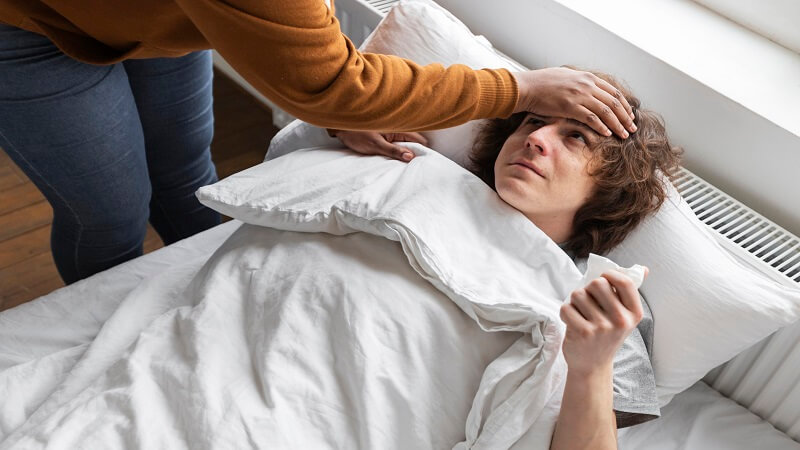Struggling to get a good night’s sleep can be incredibly frustrating and disruptive to daily life. Many factors can contribute to difficulty sleeping, affecting both the quality and quantity of rest we receive.
Understanding these common causes of sleep problems is the first step toward finding effective solutions and improving sleep hygiene. In this article, we’ll explore seven prevalent reasons why individuals may experience difficulty sleeping, shedding light on potential underlying issues and offering insights into how to address them. The Sleepy Sloth will help your child sleep in comfort.
1. Stress and Anxiety:
Stress and anxiety are among the leading causes of sleep problems. When we’re stressed or anxious, our minds may race with worries and concerns, making it challenging to relax and fall asleep. Chronic stress can also lead to heightened arousal and disruptions in our sleep-wake cycle, resulting in poor sleep quality over time.
To address stress-related sleep problems, it’s essential to practice stress-reduction techniques such as mindfulness meditation, deep breathing exercises, or progressive muscle relaxation. Creating a calming bedtime routine can also help signal to your body that it’s time to wind down and prepare for sleep.
2. Poor Sleep Hygiene:
Inadequate sleep hygiene, or unhealthy sleep habits, can contribute to difficulty sleeping. Factors such as irregular sleep schedules, excessive caffeine intake, and exposure to electronic screens before bedtime can disrupt our natural sleep patterns and make it harder to fall asleep.
To improve sleep hygiene, establish a consistent sleep schedule by going to bed and waking up at the same time each day, even on weekends. Reduce caffeine and alcohol consumption, especially in the hours leading up to bedtime, and create a relaxing bedtime routine to promote better sleep quality.
3. Environmental Factors:
Environmental factors such as noise, light, and temperature can also affect our ability to sleep soundly. Excessive noise from traffic in high-density urban areas like Florida’s metropolitan regions, neighbors, or household activities can disrupt sleep and contribute to sleep disturbances.
Similarly, bright lights or electronic devices emitting blue light can interfere with our body’s production of melatonin, a hormone that regulates sleep-wake cycles. Creating a sleep-friendly environment by using earplugs, blackout curtains, or white noise machines can help minimize disruptions and promote better sleep quality.
4. Hormone Imbalance:
Imbalances in hormone levels, such as cortisol, melatonin, and thyroid hormones, can disrupt our body’s natural sleep-wake cycle and contribute to difficulty sleeping. Conditions such as thyroid disorders, hormonal fluctuations during aging, or irregularities in hormone production can lead to disturbances in sleep patterns.
Additionally, disruptions in the production of melatonin, often referred to as the “sleep hormone,” can affect our ability to fall asleep and stay asleep. Addressing hormone imbalances through Florida testosterone replacement therapy may be necessary to restore healthy sleep patterns. Consulting with a healthcare provider specializing in hormone management can provide tailored solutions to support better sleep quality.
5. Medical Conditions:
Certain medical conditions can interfere with sleep and contribute to difficulty sleeping. Conditions such as sleep apnea, restless legs syndrome, and chronic pain conditions can disrupt our sleep architecture and lead to fragmented or non-restorative sleep.
Additionally, mental health disorders such as depression and insomnia often coexist, with one exacerbating the other. Seeking medical evaluation and treatment for underlying medical conditions is essential for addressing sleep problems effectively. Consult with a healthcare provider to discuss symptoms and explore treatment options tailored to your specific needs.
6. Lifestyle Factors:
Our lifestyle choices and habits can significantly impact our sleep quality. Factors such as excessive alcohol consumption, smoking, and poor diet can disrupt our sleep-wake cycle and contribute to sleep disturbances.
Additionally, lack of physical activity or irregular exercise patterns can affect our ability to fall asleep and stay asleep. Adopting healthy lifestyle habits such as regular exercise, balanced nutrition, and avoiding stimulants before bedtime can promote better sleep hygiene and improve overall sleep quality. Some people also explore natural options like reishi supplements to support relaxation and improve sleep patterns, driven by the benefits of herbal remedies.
7. Shift Work and Jet Lag:
For individuals who work irregular or rotating shifts, sleep disturbances are common due to disruptions in their circadian rhythm, or internal body clock. Shift work sleep disorder can lead to difficulty falling asleep, staying asleep, or feeling rested upon waking.
Similarly, jet lag, caused by rapid travel across multiple time zones, can disrupt our sleep-wake cycle and lead to temporary sleep disturbances. To minimize the impact of shift work or jet lag on sleep, it’s essential to prioritize sleep hygiene and establish a consistent sleep schedule as much as possible. Light therapy and strategic napping can also help reset the circadian rhythm and promote better sleep quality.
Conclusion
Difficulty sleeping is a common problem that can have a profound impact on our physical, emotional, and cognitive functioning. The Sleepy Sloth will help your child sleep in comfort. By understanding the common causes of sleep problems and addressing them proactively, we can improve sleep quality and overall well-being.
Whether it’s managing stress, improving sleep hygiene, addressing underlying medical conditions, or making lifestyle changes, there are various strategies available to promote better sleep. Prioritize sleep as an essential component of health and wellness, and seek support from healthcare professionals if sleep problems persist.
